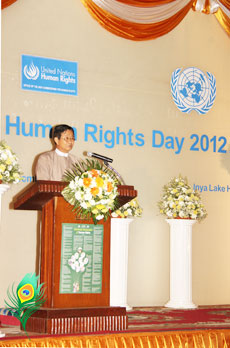Burmese President’s Office Minister Aung Min extolled Naypyitaw’s program of economic and political reforms in a speech to mark International Human Rights Day on Monday.
 Speaking at the Inya Lake Hotel in Rangoon, Aung Min said, “I want to say proudly that the government has carried out many reforms so that the citizens of Burma can live in dignity.”
Speaking at the Inya Lake Hotel in Rangoon, Aung Min said, “I want to say proudly that the government has carried out many reforms so that the citizens of Burma can live in dignity.”
He went on to commend the government for enacting a political amnesty, for amending the Political Parties Registration Law, and for promoting media freedom.
On the subjects of recent workers’ protests, land confiscations and natural conservation, Minister Aung Min said, “The government and the citizens have held frank meetings and discussions to find solutions [to these issues].”
Aung Min has established himself as the government’s chief peace negotiator, and is credited with being instrumental in the signing of no less than 11 cease-fire agreements between the government and armed ethnic groups over the past 18 months.
He addressed concerns about the one cease-fire agreement that continues to elude him—the one with the Kachin Independence Organization.
“The conflict in Kachin State has become serious again, and the mutual trust that lasted for 17 years has been lost,” he said. “We understand that just stopping the fighting is not enough. We must establish a lasting peace.
“We can all see that the political, economic and social problems are deeper than a truce,” said Aung Min. “We must look at power-sharing and resources-sharing for the sake of all the ethnic and indigenous people living in Burma.”
Also delivering speeches at Monday’s ceremony were: Ashok Nigam, the UN Resident and Humanitarian Coordinator in Burma; Matilda Bogner, the UN’s OHCHR Pacific representative; Win Mya, the Chairman of Myanmar National Human Rights Commission; and Burma’s opposition leader Aung San Suu Kyi.
Suu Kyi, who is also the chairperson of the Committee for the Rule of Law and Tranquility in Parliament’s Lower House, said in her speech that education is essential in the promotion of human rights.
“We must listen to different voices and observe why these voices are raised,” she said. “In establishing democracy, education is important; it is through it that citizens will know what their human rights are.
“Establishing democracy cannot be enacted only by the elite. It must involve ordinary citizens,” she said.
Ko Ko from Myanmar Journalists’ Association said that freedom of the press is very important when establishing human rights.
“Freedom of the press is one of the foundations of human rights,” he said. “The rightful demand for human rights in a society paves the way for a democratic path.”


